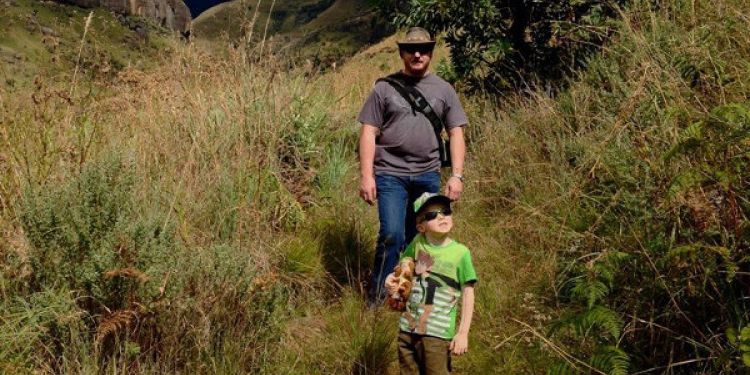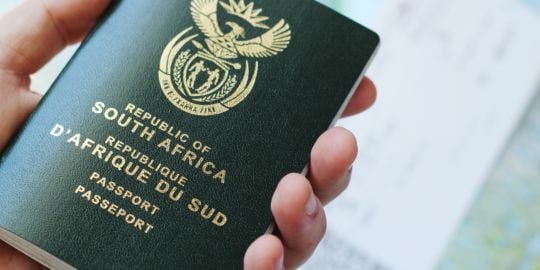Where are you from, Agnieszka, and what are you doing nowadays?
I'm Polish and I've been living in Johannesburg for more than 8 years now. I occupy a senior management role of an international company that produces cosmetics. I have a South African husband and a 6 year old son who was born here. So I'm now a bit of a permanent fixture in South Africa and not just an expat.
Why did you choose to expatriate to South Africa?
I was given the opportunity to develop my career in a beautiful, warm country, offered a relatively decent salary, so I took it. I didn't really think much about where I would like to go. I was single and flexible at that time, and I loved traveling. I thought that working in such a diverse country, so different from Poland, would give me new perception on my life and career, and that this will be valuable experience. I was not mistaken.
What were the procedures to follow for a Polish national to move there?
The company I worked for took care of everything. This was before the change in regulations. I came on tourist visa and while here, the company applied for Intracompany visa for me. Now you can no longer do this. Application has to be done in the country of residence.

What has attracted you to Johannesburg?
I would actually prefer to live on the coast somewhere, preferably Cape Town, but salaries in Johannesburg are quite a lot higher. I also like the vibe of Johannesburg, the proximity to Kruger Park and Drakensberg (I absolutely love nature and mountains) and weather - comparatively mild (by African standard) summers and sunny winters. Realistically... I think that most expats who move to South Africa arrive to a specific job and the location within the country is not always a priority. I know expats who live and work in very industrial and not so attractive parts of the country. If the priority was location, they wouldn't be there.
How did you proceed to find a job there? What are the local labor market's features?
I'm one of those expats who came here with a job, so didn't have to find one. This obviously makes things easier because pressure to start earning salary is not there. South Africa is not a cheap country. If you don't work, savings will not last long. As regards the local market, I recently changed jobs. I was actually approached directly by one of the directors, so had it the easy way again. But before I accepted the current role, I also went for couple of interviews in other international companies. What they look for is good experience from multinational and multicultural organizations and a lot of flexibility. Being able to travel was a big thing, at least in my field (Procurement).
Was it difficult to find accommodation there?
Most expatriates live in gated and secure housing complexes. That's also how I started. The company put me in contact with an estate agent and that was pretty much it. I could choose the area and type of accommodation that fitted my budget. It wasn't easy though. Being new in Johannesburg, you don't know really where to look and tend to stick to typical expat areas, which are lovely, but tend to be expensive. On the word of advise, I would suggest to find a local friend or work colleague, or a long-term expat who can help you to make right decision. Another thing is that the deposit to rent place can be high and contracts are usually long-term. So it is important to make the right choice (in terms of location and budget) as it may be difficult to terminate or change the contract. Again, employers often help with those arrangements.
How do you find the South African lifestyle?

I love the outdoor and the social scene. In Poland, we don't go out as much. I love the space - gardens and swimming pools that seem to be a typical feature of a lot of houses. The weather also makes a huge difference, it impacts everything: activities, moods, the way you relax... There is so much to see in South Africa that I'm no longer surprised that South Africans don't travel much. And why should they? In South Africa, you can find anything. I also like how children-friendly South Africa is compared to many European countries (despite child free zones). There are a lot more places with big playgrounds with child carers than in Europe where the best you can usually get is a little room with plastic tables and crayons or computers.
Have you been able to adapt yourself to the country and to its society?
It wasn't easy at first. Poland has a very direct culture: you say what you think. There is a funny Polish expression "bez ogródek" that has been literally (although not linguistically correct) translated as "through the garden". So that's how you express yourself. Even if it means tramping through somebody else's "thought garden". I'm not sure if you are getting the meaning if this, but I'm sure you sense that it cost me some potential friends! Other than that - I work (and previously also did) in an international team with a lot of foreigners who tend to "gravitate" around each other. My husband is South African, so for me it was easier to get immersed in the South African lifestyle.
What does your every day life look like in Johannesburg?
There are some differences, but I don't think it would differ much from anywhere else. I get up, get myself and the kid ready for school. I take him to school and go to work. My husband picks him up from school and makes dinner for him. I come home, we cook, I work out a bit, watch a bit of TV, talk to my husband about important things. Then we go to sleep... Usual life. The significant difference is switching on the alarm in the evening and switching it off in the morning - I never lived in a place where I would need an alarm in the house. Another thing is that in South Africa you will end up doing a lot less housework than, for example, in Europe. Almost everyone here hires someone to do the cleaning and gardening - once or twice a week and people with larger houses even on daily basis. Those helpers often do cooking and look after children. They are often underpaid and an undervalued part of life in South Africa.

What has surprised you the most at your arrival?
The biggest shock was how cold it can get here in winter. Houses are not insulated and there is not central heating. I never thought I would need heating in South Africa. When I arrived in May, it was still relatively warm. Not for long though! In winter, just after my arrival, it snowed in Johannesburg and temperatures at night went down below 0 °C. It wasn't much warmer in my flat.
Another one was a complete lack of usable and scheduled public transport. I really haven't expected that. It's a lot better now with Gautrain and new bus lines, but then, 8 years ago it was a real problem, especially since I was not a good driver. There aren't many pavements to allow foot traffic either, so lots of people simply walk on streets. And then, the number of domestic animals on roads (even on highways) in rural areas was also a bit of a shock. It is very dangerous for drivers and for the animals as well.
On the positive side, I was surprised how well-developed the banking sector is. ATM's are plentiful, payment by credit card can usually be done even in rural areas, and if you can't pay by credit card, you can send money from someone's mobile phone.
Any particular experience in South Africa you would like to share with us?
I remember when I got to the petrol station and wanted to fill my car tank for the first time in South Africa. It was daytime, but the petrol station was pretty empty. I got out of the car, took the pump from the holder, pulled out my credit card and started looking for a slot for it, when I was approached by very surprised gentleman who clearly had no idea what I was trying to do. Only then, I realized that in South Africa you don't fill your car tank yourself.
What is your opinion on the cost of living in Johannesburg? Is it easy for an expat to live there?

South Africa is not a cheap country. Depending on the type of the contract, expats have to consider fees that are not applicable in many other countries - like medical aid cover or schooling for children. Coming from Europe, where education, medical care and pension are provided for free (they are part of the taxes), it is very easy to underestimate how expensive it can get to live in South Africa with family, especially in Johannesburg where it's more expensive to rent the place as well. Meat and vegetables are cheaper in South Africa than they are in Europe (although it may be necessary to adjust the range) and personal care products are similar or a bit more expensive here. Overall, groceries are cheaper here than in Europe (including Poland). The biggest difference I noticed in eating out - even though the prices in South Africa have been progressively increasing - it is still a lot cheaper to go out in South Africa than pretty much anywhere in Europe.
How do you spend your leisure time?
It depends. If it's a week day, then, depending on my energy level, I exercise, or relax. If I exercise, it's usually jogging, dancing on my trampoline, spinning or punching and kicking the exercise bag. I used to go to the gym, but decided that I actually prefer to exercise at home. If I'm tired, I just read or watch TV.
I also write a blog in Polish about South Africa which I find quite rewarding. I usually collect information and give my own insights in my posts. So it keeps my mind busy with non-work stuff when I need break from work! On week-ends and holidays, we like to get away.
Although I'm not a "beach bum", I like South African coast. I could spend hours walking around. We also often go to Drakensberg. We all enjoy hiking (and that includes my 6 year old son, who recently requested to sleep in a cave). My husband recently took him fishing. So we also do that on week-ends.
And there are of course the nature reserves that are absolutely wonderful. We love Kruger Park, but also visit Pilansberg often as it's closer. We did a few road trips around South Africa and neighboring countries, the best one was around Namibia. It was absolutely stunning! We also like riding our motorbikes.
Your favorite local dishes?
My big time favorite is bunny chow! I'm not a fussy eater, I eat all types of food - vegetables, meat and seafood alike. South Africa has fantastic cuisine. Everyone will find something for themselves here. There are various influences from different countries that are distinctly noticeable - great balance of Indian, Chinese, European (big impact here had Portuguese and French) and ethnic African. From the meats, nothing beats flame grilled steak done to your liking. And life will never be the same without biltong and South African wine. I'm seriously considering being an importer of both if we leave South Africa and settle elsewhere.
What are the differences between life in Poland and in South Africa?

Everything! Starting from the weather, going through habits, transport, lifestyle and ending on the traditions and holidays. In Poland (and the rest of Europe) we have four distinct seasons. In winter it's cold and it snows, in spring everything turns green, summers are warm, and in autumn everything turns yellow and orange. Here in South Africa, there are pretty much two seasons - sunny and a little bit cold, and less sunny, warm with some rains. The South African winter is mild, but it does get cold at night - I already mentioned how surprised I was at that revelation.
In South Africa, everyone drives everywhere. In Poland we walk or use public transport, or ride a bicycle. Here, riding a bicycle on a road is a bit of an extreme sport with no bicycle lines ant taxis zooming past.
In Poland, we celebrate Christmas and Easter I a lot more "family way" than here in South Africa, and they also have bigger religious significance then here. Even non-religious people follow the tradition of family supper of Christmas Eve and midnight mass and taking basket of produce (usually bread, eggs, meat etc.) to have it blessed on Easter Saturday. Same with fast - although Poles are pretty modern, there are two days of very strict fast that almost everyone observes, regardless if they are religious or not - it's Christmas Eve and Good Friday.
As regards general lifestyle, in Poland we hardly use cleaners or maids to help us out with housework, and it's not due to financial issues. The Polish housewife wants to do everything herself because she believes that no one can do it better. And she usually forces her Polish husband to do his part in terms of house maintenance. It does not matter if he is a company CEO. It's changing though, because no one can be good at everything, but that's how we were brought up. Getting paid help is frowned upon.
What do you like the most about Johannesburg?
I like how green and leafy the suburbs are. I like the space, the weather and the restaurants. In fact, this is not about Johannesburg. It's about South Africa! I think there are better places here than Johannesburg (like Capetown...) but Johannesburg is still a fantastic city.
What do you miss the most about your home country?
I miss the infrastructure and public transport, that things work and you don't spend a whole day or more in a municipality or other government office... I miss Polish forest with wild mushrooms and berries. I miss bicycle lanes where I can ride my bike for hours without fear of being knocked over. And I really, really miss central heating in wintertime!
Would you like to give any advice to soon-to-be expatriates in South Africa?
"Buy a donkey"! No seriously. If you hear that, this only means "thank you", not an instruction to buy this somehow very useful and hardworking animal. South Africa is a beautiful country, but what you make out of it, whether you will enjoy or not depends a lot on attitude. I have friends who love it and have friends who hated it (those ones are not here any more). I always say that South Africa is a country of extreme pluses and extreme minuses.
What are your plans for the future?
I think at some point of our life, we will go back to Europe. But for now, we enjoy being here and living the "South African Dream".

















Contact us to be featured in the Interviews section.
Participate